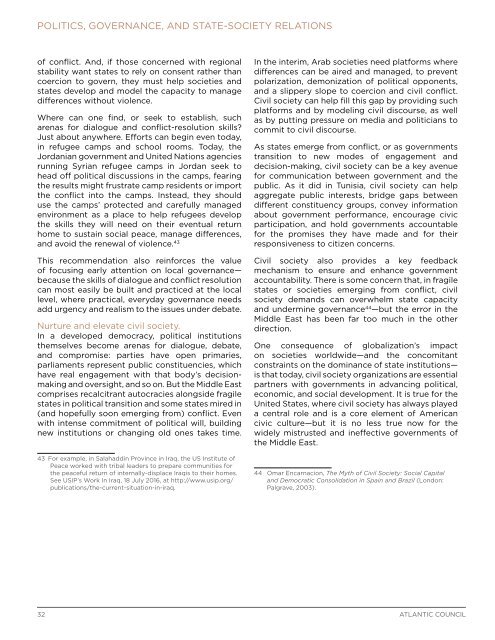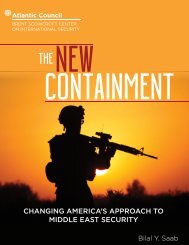POLITICS GOVERNANCE STATE-SOCIETY RELATIONS
Politics_Governance_and_State-Society_Relations_web_1121
Politics_Governance_and_State-Society_Relations_web_1121
You also want an ePaper? Increase the reach of your titles
YUMPU automatically turns print PDFs into web optimized ePapers that Google loves.
<strong>POLITICS</strong>, <strong>GOVERNANCE</strong>, AND <strong>STATE</strong>-<strong>SOCIETY</strong> <strong>RELATIONS</strong><br />
of conflict. And, if those concerned with regional<br />
stability want states to rely on consent rather than<br />
coercion to govern, they must help societies and<br />
states develop and model the capacity to manage<br />
differences without violence.<br />
Where can one find, or seek to establish, such<br />
arenas for dialogue and conflict-resolution skills?<br />
Just about anywhere. Efforts can begin even today,<br />
in refugee camps and school rooms. Today, the<br />
Jordanian government and United Nations agencies<br />
running Syrian refugee camps in Jordan seek to<br />
head off political discussions in the camps, fearing<br />
the results might frustrate camp residents or import<br />
the conflict into the camps. Instead, they should<br />
use the camps’ protected and carefully managed<br />
environment as a place to help refugees develop<br />
the skills they will need on their eventual return<br />
home to sustain social peace, manage differences,<br />
and avoid the renewal of violence. 43<br />
This recommendation also reinforces the value<br />
of focusing early attention on local governance—<br />
because the skills of dialogue and conflict resolution<br />
can most easily be built and practiced at the local<br />
level, where practical, everyday governance needs<br />
add urgency and realism to the issues under debate.<br />
Nurture and elevate civil society.<br />
In a developed democracy, political institutions<br />
themselves become arenas for dialogue, debate,<br />
and compromise: parties have open primaries,<br />
parliaments represent public constituencies, which<br />
have real engagement with that body’s decisionmaking<br />
and oversight, and so on. But the Middle East<br />
comprises recalcitrant autocracies alongside fragile<br />
states in political transition and some states mired in<br />
(and hopefully soon emerging from) conflict. Even<br />
with intense commitment of political will, building<br />
new institutions or changing old ones takes time.<br />
43 For example, in Salahaddin Province in Iraq, the US Institute of<br />
Peace worked with tribal leaders to prepare communities for<br />
the peaceful return of internally-displace Iraqis to their homes.<br />
See USIP’s Work In Iraq, 18 July 2016, at http://www.usip.org/<br />
publications/the-current-situation-in-iraq.<br />
In the interim, Arab societies need platforms where<br />
differences can be aired and managed, to prevent<br />
polarization, demonization of political opponents,<br />
and a slippery slope to coercion and civil conflict.<br />
Civil society can help fill this gap by providing such<br />
platforms and by modeling civil discourse, as well<br />
as by putting pressure on media and politicians to<br />
commit to civil discourse.<br />
As states emerge from conflict, or as governments<br />
transition to new modes of engagement and<br />
decision-making, civil society can be a key avenue<br />
for communication between government and the<br />
public. As it did in Tunisia, civil society can help<br />
aggregate public interests, bridge gaps between<br />
different constituency groups, convey information<br />
about government performance, encourage civic<br />
participation, and hold governments accountable<br />
for the promises they have made and for their<br />
responsiveness to citizen concerns.<br />
Civil society also provides a key feedback<br />
mechanism to ensure and enhance government<br />
accountability. There is some concern that, in fragile<br />
states or societies emerging from conflict, civil<br />
society demands can overwhelm state capacity<br />
and undermine governance 44 —but the error in the<br />
Middle East has been far too much in the other<br />
direction.<br />
One consequence of globalization’s impact<br />
on societies worldwide—and the concomitant<br />
constraints on the dominance of state institutions—<br />
is that today, civil society organizations are essential<br />
partners with governments in advancing political,<br />
economic, and social development. It is true for the<br />
United States, where civil society has always played<br />
a central role and is a core element of American<br />
civic culture—but it is no less true now for the<br />
widely mistrusted and ineffective governments of<br />
the Middle East.<br />
44 Omar Encarnacion, The Myth of Civil Society: Social Capital<br />
and Democratic Consolidation in Spain and Brazil (London:<br />
Palgrave, 2003).<br />
32 ATLANTIC COUNCIL



